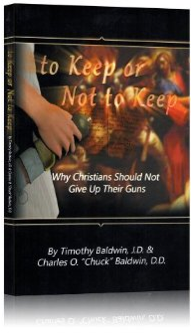
Christians not only have the right to keep and bear arms, but they have the obligation to do so in the defense of freedom. This is the powerful and provocative thesis of a new book by Tim Baldwin and his father, Chuck Baldwin.
In their book, To Keep or Not to Keep, the Baldwins — Tim is a Second Amendment scholar and attorney, while Chuck is a minister and former Constitution Party presidential candidate — argue that “Christians should not give up their guns.” They back up their claim with logic and scripture, a rare combination even among gun-rights advocates.
The authors warn readers:
Gun opponents have been highly successful in disarming the citizenry of other nations. So the threat to America is real, not just theoretical. If something does not seriously change in the attitude of Americans, our future looks similar to those who have lost meaningful and free gun possession. Unfortunately, this kind of self-defense-rejecting philosophy is becoming prevalent in America. But only one philosophy will ultimately prevail. The philosophy that succeeds will determine between two very different futures.
The Baldwins draw a clear and critical distinction between simple gun possession and meaningful, divinely-dictated gun possession.
It likely sounds strange in the ears of many Americans that God has commanded his children to own weapons and to wield them in defense of liberty. To Keep or Not to Keep presents an overwhelming cache of compelling evidence that this is indeed the case.
There are, of course, those believers that cling to the notion that government licensing of the right to keep and bear arms is reasonable and that the Constitution should be interpreted accordingly. That is to say, these people believe there is a “constitutional right” to own a gun, but that government has the authority to infringe upon that right in order to maintain peace and safety. There lies the rub.
The sophistry of gun opponents has been so subtle that even the very elect, so to speak, have been duped into accepting government prerogative over a right given by God.
In a most masterful manner, the Baldwins use the word of God to disabuse Christians of this false doctrine and to convince them of their duty to defend freedom with arms. Some, however, remain unconverted.
“But what does a constitutional right matter to a Christian who believes scriptures command him to obey the government no matter what? And what does a constitutional right matter to a Christian who believes scriptures command him to obey laws that remove meaningful self-defense against criminal and tyrant? Christians that believe God commands him to give up his guns where the law commands apparently need further persuasion that such a law is not only unconstitutional but also opposed to Scriptures.”
The purpose of this book is to offer that “further persuasion,” and it accomplishes that aim with extraordinary clarity.
Literally citing chapter and verse from the King James Version of the Bible, the authors present three maxims and four arguments to help the reader realize the scriptural soundness of the responsibility of Christians to repel tyranny by force of arms.
The maxims are:
1. The Greater Principle Contains the Lesser Principle. In this maxim, the Baldwins explain “The Pharisees were content that men be ruled by tyrants and that men question God’s justice on earth. But Jesus did not follow the harmful doctrine of destroying life for the sake of following a law. Jesus preferred justice over religion.”
2. When an Interpretation is Susceptible of Two Meanings — One in Favor of Natural Rights and the Other Against It — the Former Must be Adopted. Here, the authors show how God-given natural rights compel Christians to protect themselves from those who would ignore these rights and threaten the safety of their fellowmen. “Without natural rights, man would have no duty or desire to do anything but satisfy one’s own lust, which for some includes oppressing the meek. To deny the right of preservation and protection rejects the most fundamental laws of God and purposes of man.” Then, with an illuminating analogy, the authors ask, “what would a Christian believe about a law that prevented people from eating?”
3. The Interpretation Must be Reasonable, Not Absurd. Here, readers are reminded that God requires protection and improvement. “God did not create and save man — from being ‘slaves to sin’ to being ‘sons of God’ — for Christians to become the slaves of tyrants.”
After presenting these points, the authors refute four arguments used by gun-rights opponents to contradict the maxims laid out above. In a very well-founded and enlightening way, the authors deconstruct these four arguments. The four arguments are:
1. Rejoice in Suffering. The authors write that the idea to “Rejoice in suffering equals no self-defense is illogical.” In support of their assertion that “defense of the innocent is a universal principle,” they explain, “Given that self-defense derives from an act of love, this conclusion should not be curious given the New Testament’s emphasis on loving one’s neighbors as himself. Where a person is forced to defend others, he defends out of sacrifice and love in protecting ‘the least of these.’ Clearly, love is the greatest of all Christian attributes and commandments.”
2. If You Live by the Sword, You Will Perish by the Sword. In what is perhaps the most powerful part of their book, the Baldwins recount that Jesus commanded his followers to purchase a sword in defiance of Roman law (Luke 22:35-36). “That Jesus would instruct his disciples to buy swords when that was a capital offense under Roman law is significant. What is also notable about this is that during the years Jesus led his disciples, he knew his disciples carried swords against Roman law. Yet, he never ordered them not to carry swords. Similarly, the disciples never gave up their swords in face of the Roman law, and when Jesus told them each to buy one, they intended to obey Jesus rather than Roman law.” Where, one wonders, has the understanding of this principle and the dedication to heed the word of God in defiance of immoral government gone?
3. Do Not Resist Evil. The authors refute this particular argument, saying that during his mortal ministry, Jesus taught “when killing is without cause, it is unlawful, but when killing is with just cause, it is lawful.”
4. Do Not Render Evil for Evil. Citing a slew of New Testament scriptures, the authors negate this misreading of the teachings of Christ, writing, “Lawless justice creates chaos, perpetuates evil actions against one another, and causes ‘souls to be spoiled.’ At the core of God’s instructions concern all civil relationships, promoting good and punishing evil is essential. Just as man would not surrender everything he owns to a slothful neighbor, a man would not surrender his rights to a tyrannous government.”
In the spirit of many of the writings of our Founding Fathers, To Keep or Not to Keep is at the same time a religious tract and a call to action in the defense of liberty. All Christian citizens are encouraged to read this book, read the scriptures presented in it, and then follow the commandment of the Lord to love their neighbor as themselves. As the Baldwins write:
If Christians do not become convicted about the most fundamental matter of our existence as God’s creation, then perhaps nothing will. But if Christians see the need for protecting and preserving life against criminal and tyrant, they will also see the importance in not surrendering their right to self-defense and thus, their guns, of which the semi-automatic rifle stands supreme.
To Keep or Not to Keep: Why Christians Should Not Give Up Their Guns by Tim and Chuck Baldwin is available now.
Joe A. Wolverton, II, J.D. is a correspondent for The New American and travels frequently nationwide speaking on topics of nullification, the NDAA, and the surveillance state. He can be reached at [email protected]



